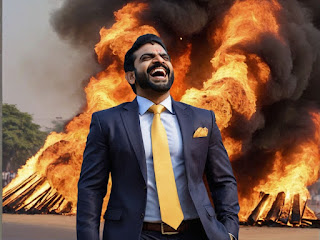Despair, Delhi & Dhaka
Reading time : 3-4 Minutes
As I reflect on the recent tragedy at Rau's IAS Study Circle in Delhi, my mind drifts to the Ramayana, an epic that has always intrigued me. Why, I have often wondered, did Ravana, a so-called intellectual, allow his city to burn and his family to perish? Were his actions driven solely by desire, or was there something deeper at play? This question has haunted me, and as I ponder the tragic deaths of young UPSC aspirants in Delhi and protesting students in Dhaka, I begin to see a pattern in the human psyche: the older generations often cling to power at the expense of the youth.
Ravana's story is one of immense complexity. Here was a man of great intellect and power, yet he allowed his ambitions and desires to consume him, leading to the destruction of his kingdom and the death of his loved ones. As I read the Ramayana, I wonder: why did Ravana make such choices? Was it merely his insatiable hunger for more power, or was it his desperate clinging to the authority he wielded? The questions swirl, and I see parallels in today's world.
The recent deaths of UPSC aspirants in a Delhi coaching centre, along with the tragic demise of students in Dhaka protesting for their rights, provide a stark reminder of this pattern. These young individuals, filled with hope and determination, sought to better their lives and their nations, only to be met with tragedy. The establishments, it seems, resist listening to the youth. Civilisations have flourished due to the wisdom of older generations and the aspirations of younger ones. Yet, we now find ourselves in a historical moment where the older generation is perceived as stifling the dreams of the younger.
This clash between generations is not new. Throughout history, we see how the established order resists change, often at great cost. The youth demand progress, fairness, and transparency, while the older generation clings to power, unwilling to relinquish control. This generational struggle is evident in the bureaucratic inertia that contributed to the Delhi tragedy and the heavy-handed response to student protests in Dhaka.
The bureaucratic machinery in Delhi failed the young aspirants who lost their lives. The Municipal Corporation of Delhi (MCD) should have ensured proper drainage systems and safety protocols, but bureaucratic inefficiencies and red tape often lead to dire consequences. This incident points to the urgent need for immediate and comprehensive reform. The coaching center owners, too, cannot evade culpability. Their prioritisation of profit over safety is a stark reminder of the moral and legal responsibilities that come with running educational institutions. It is imperative to hold them accountable, not just through legal channels but also through societal pressure and moral condemnation. Their negligence has cost lives, and this must serve as a lesson for all educational entrepreneurs to prioritise safety over financial gain.
The youth of India, much like their counterparts in Dhaka, have emerged as torchbearers for change. They demand accountability, transparency, and systemic reforms. The student protests in Dhaka, triggered by similar safety concerns, resonate with the plight of the young lives lost in Delhi. This youth activism transcends national boundaries and underscores the universal desire for safer educational environments. The collective voice of the youth is a powerful force that can drive significant change.
Solidarity across borders is essential in amplifying calls for safer educational spaces. The Dhaka student protests remind us that youth activism knows no boundaries. By standing together and supporting each other’s demands for safety and accountability, we can create a unified front that compels authorities to prioritise the well-being of students.
As I pen these reflections, I am filled with a mix of anger and sorrow. We owe it to the lives lost in this tragedy to create a world where the older generation supports and empathizes with the younger generation to evolve into more civilized, happy and thriving human beings.
Ravana is considered a villain because he did not listen to the younger generation and sacrificed his sons for his lust and desires. Today's Ravanas, our governments, similarly sacrifice the younger generation for the sake of power. We are at a critical juncture in history, where the older generation must recognise the aspirations and needs of the youth. Failing to do so will not only lead to more tragedies but will also hinder the progress of our civilization.





Comments